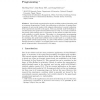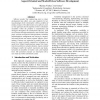207 search results - page 7 / 42 » Genetics as a role model for software variability management |
100
click to vote
KES
2000
Springer
15 years 2 months ago
2000
Springer
Agent-based computational economic modeling requires demanding work on computer programming. Usually, the publications as outcomes of running these programs do not provide readers ...
124
click to vote
SPLC
2007
15 years 8 days ago
2007
Software product line engineering aims to reduce development time, effort, cost, and complexity by taking advantage of the commonality within a portfolio of similar products. The ...
SEW
2006
IEEE
15 years 5 months ago
2006
IEEE
Complex software systems typically involve features like time, concurrency and probability, where probabilistic computations play an increasing role. It is challenging to formaliz...
ICSE
2008
IEEE-ACM
15 years 11 months ago
2008
IEEE-ACM
Software product line engineering is mostly about the systematic management of commonality and variability between product line members. The effectiveness of this approach thus ve...
80
Voted
ICSE
2007
IEEE-ACM
15 years 11 months ago
2007
IEEE-ACM
Modern multiuser software systems have adopted RoleBased Access Control (RBAC) for authorization management. This paper presents a formal model for RBAC policy validation and a st...


